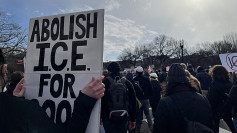Donald Trump connects LA wildfires to Delta smelt protections, a claim experts call misleading and politically charged, ignoring climate challenges.
In a series of tweets, a press conference, and a White House directive, Donald Trump has insulted the Delta smelt, calling it a "worthless fish," and has linked the tragic wildfires in Los Angeles to efforts to preserve the species.
Experts claim that the US president's readiness to denounce an endangered species is indicative of the disorganized and narrow-minded character of his environmental policies, even though the Delta smelt in California has little to no bearing on the city's water supply.
"It's scapegoating an internal enemy that's supposed to be responsible for all our problems, in this case, fires and drought -- and directing everybody's anger toward that," said John Buse, chief counsel for the Center for Biological Diversity, in an interview with AFP.
He claims this is a "typical authoritarian" action that foreshadows Trump 2.0's policies.
The allegation that Trump made, initially on Truth Social, was that firefighting efforts had been hindered because Governor Gavin Newsom had not signed an order enabling millions of gallons of water from the north of the state to flow southward from surplus rain and snowmelt.
"Putting People Over Fish: Stopping Radical Environmentalism to Provide Water to Southern California" was the dramatic title of his first executive order, in which he repeated the claim.
The water situation in California is multi-faceted, and climate change is a major contributor.
The tiny, see-through fish known as the Delta smelt is actually a "sentinel" species that shows how well the Sacramento-San Joaquin Delta is doing ecologically. However, it is not to blame.
Peter Moyle, an ichthyologist from the University of California, Davis who is generally considered the foremost authority on the species, stated that this fish used to be plentiful in the upper estuary and supported a variety of predators, including striped bass.
Nevertheless, the Delta smelt was designated as "vulnerable" in 1993 and "endangered" by California in 2009 because to habitat degradation brought about by water diversions for urban and agricultural uses, invasive species competition and predation, exposure to toxins, and diminishing food supplies.
California water projects must find a middle ground between reducing water waste and satisfying the needs of cities and farms.
A political narrative that has previously pitted fishermen against fisherman in California has become nationalized by Trump's rhetoric, with the Delta smelt serving as a suitable "scape fish," as Moyle puts it.
Problems arise for smelt and other aquatic life as a result of massive pumping stations that are operated by the federal government and individual states.
Sucked onto screens or diverted into canals, the fish die from the increased salt caused by these pumping activities.
In spite of Trump's assertions to the contrary, the Los Angeles water supply has been unaffected by safeguards that reduce pumping for fish such as the Delta smelt.
Buse clarifies that the federal Central Valley Project, which Trump has designated as a target in his order, mostly benefits Central Californian agriculture and not Los Angeles.
The State Water Project does provide water to Southern California, including Los Angeles, but according to official statistics, most of the state's major reservoirs, especially in the south, are at or above their historic levels for this time of year.
Protections for the Delta smelt contribute very little to decreases in outflow, even in years with less precipitation.
The quantity of precipitation and meltwater entering the San Francisco estuary is the main element influencing the amount of water that is pumped downstream.
Restrictions on water exports are largely driven by saltwater, which is bad for fish but also causes major problems for agriculture (Moyle, 2017).
According to Tufts University sociologist Caleb Scoville, the legal preservation of the Delta smelt has been highly contentious due to the fact that politicians and right-wing commentators have taken advantage of the species' diminutive size.
Scoville stated that Trump's language transforms difficulties linked to environmental instability into political cliches instead of tackling the underlying reasons of California's water problems, which include climate change.
According to him, it promotes a sense of us-versus-them identity politics without actually bringing those in power to justice.





